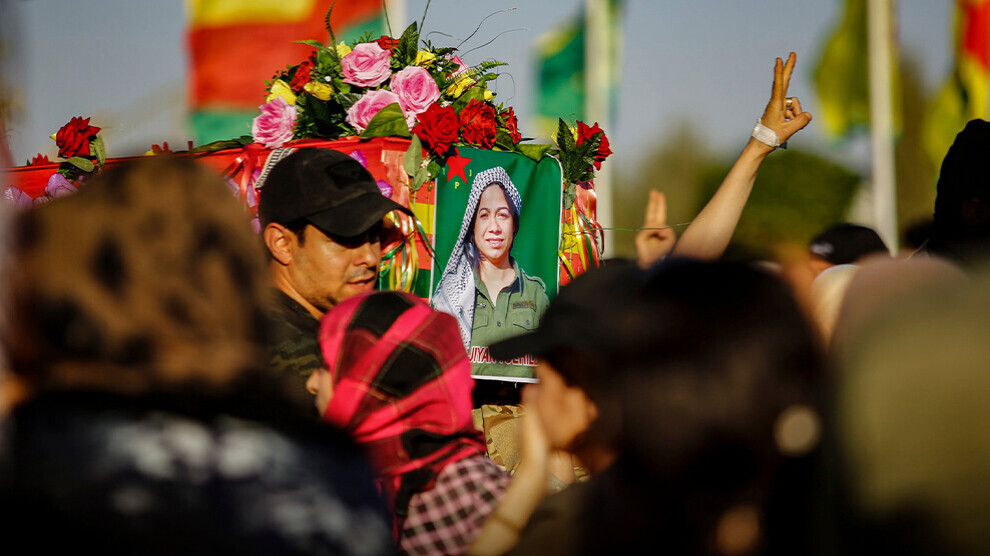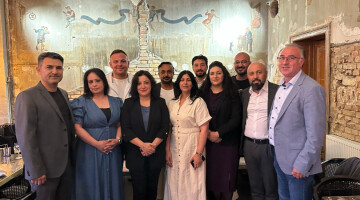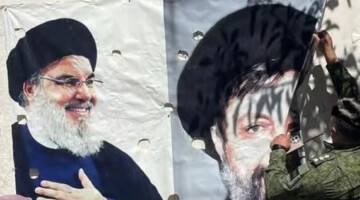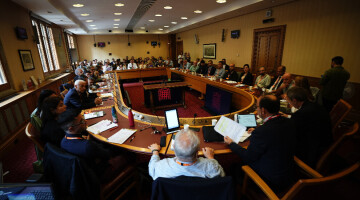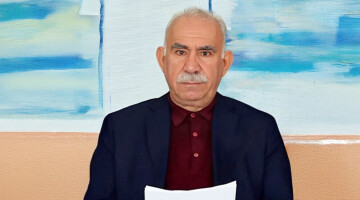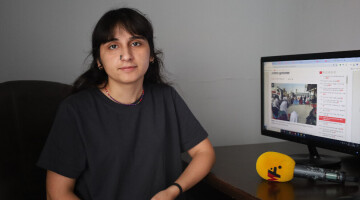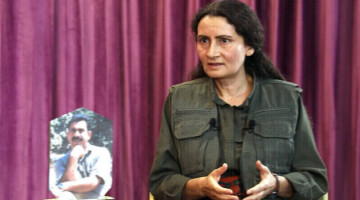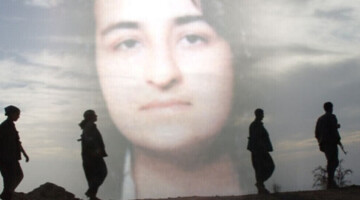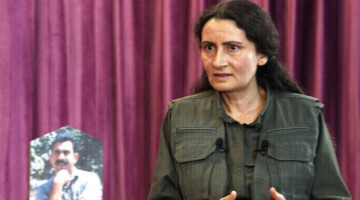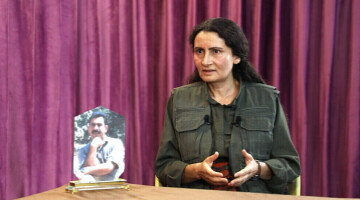YPJ internationalist Nudem Tolhildan Nudem Tolhildan describes the situation during the last few months of low intensity warfare from her perspective.
Part one of this 'open letter' can be read here
A Call-Out: European Responsibility
How can people from Europe turn their eyes away from the ongoing genocide of the Kurdish people, who are used as a bargaining chip by Europe? I don’t mean the states, who are playing this lethal game, but we the people. How can we be so estranged from the reality of the world that we leave these events unanswered, and unnoticed even?
During the Cold War, NATO used Turkey as a buffer against the Soviet Union. In recent years the EU has been using it as a gatekeeper, giving money to Erdogan to stem the flow of refugees towards the borders of Greece and Bulgaria, and selling them the tanks and other weapons that Turkey may use to roll over this village tomorrow. In western Europe we are taught to forget, and to ignore the wars we are involved in and the reality that the third world war actually began long ago, not with Ukraine. Abdullah Ocalan once said that 50% of the Kurdish freedom movement’s fight is against the Turkish state and the other 50% is against the powers that support it, NATO chief among them. Without their permission, Turkey cannot even lift a finger in the region.
What does internationalism mean in this context?
When people talk about internationalism as if it was about fighting in someone else’s war, they have completely misunderstood what is happening in Kurdistan. As Europeans, as Germans, this is our war. Until we decide to actively side with the democratic forces in the Middle East, we are supporting the wrong side. Our silence kills. And just as many brave comrades from Turkey came here and fell Şehîd in the fight against their own state, Europeans also came, and should keep coming in even greater numbers.
We need to take responsibility for the fight to build a free life and protect basic human values. In particular, coming here as a woman from around the world is a very meaningful contribution. It is also a huge opportunity- to learn from the decades of experience of the Kurdish women’s liberation struggle. Fighting and organizing alongside the female comrades, I learned more about myself, the culture in Europe and the Middle East, the reality of the anti-colonial and anti-patriarchal struggle in a few months than I ever had before in my life. YPJ is a democratic force for women’s liberation, made up of women from society joining together to defend their homeland.
It is a big opportunity that the women’s liberation movement here is calling on feminist women and women fighting for freedom worldwide to join their ranks. But also if we cannot travel here, we can actively take part in the struggle by organizing in the places we live, such as with the Women Defend Rojava Campaigns or by organizing self-educations on the ideology of the movement. We can play a decisive role as internationalist women, and take our place in the century of women’s liberation.
Long ago the enemy recognized the danger organized women pose to him. This year, many precious, brave female comrades were targeted and fell Şehîd, such as Şehîd Jîyan Tolhildan who played an important role in the fight against ISIS or Şehîd Zîlan (Nagihan Akarsel) who was contributing immensely to the development of Jineolojî, the science of women and life that is integral to the Kurdish liberation struggle, and many many more. Turkey has established a culture of femicide against the movement, which we are answering with even greater resistance.
The war against the Freedom Movement wages in the mountains
The war against the Kurdish people, and the war against humanity that Turkey is waging does not only concern Rojava. Actually, Rojava itself is only a small part of it. We must look to the other parts of Kurdistan and to other parts of the Middle East to get a more complete picture.
The revolution in Rojava is so deeply connected to the war in the other parts of the region, that war in one place affects the other areas and vice versa. It's a black mark on the international community of open-hearted peoples, and on the societies in Europe that Turkey has been able to wage a brutal war in the mountains of South Kurdistan now for six months with chemical weapons, with so little public reaction, much less condemnation.
To bring attention to Turkey’s use of chemical weapons in the mountains, in October two female guerrilla, Şehîd Sara Tolhildan and Şehîd Rûken Zelal, made a self-sacrifice action and blew themselves up in a police station in the city of Mersin (a city in Northern Kurdistan, Turkey). They took this extreme step with hopes to break the complete silence around the crimes against humanity Turkey commits with NATO’s help. The poison gas Turkey uses is bought from Western countries and the technology is produced in Europe. Just a few weeks ago, the guerilla forces published a video of a guerilla fighter dying from the chemical weapons, which we have to read as an urgent outcry. Why is no one reacting to this? Why is everyone just letting it happen as if it is normal? Why are there no solidarity actions against this? No public statements against it? If we can get so used to this kind of violence that it no longer moves us to see these kinds of images, we are killing what’s left of our own humanity. Turkey has also used chemical weapons on the civilian population in Rojava.
It was officially proven in the case of a young boy during the invasion of Serekaniye, and again in recent days in a village outside of occupied Efrin. If we let it happen, Turkey will continue to do it. The necessity both to struggle and to increase our struggle every day, is clear.
Let’s get organized and take part in the Women’s Revolution
Fighting the war here is not only a matter of weapons and physical confrontation. It’s also a war of disinformation and manipulation, a war of ideology, a war over the economy, and a war against culture and against nature. It is a theatre of the third world war, and involves all major hegemonic forces.
One friend, when discussing strategies for winning this fight, emphasized the crucial role of the people in Western states, who must rise up to change the current politics and prevent the weapons industry from profiting from genocide. The friends here have recently been asking us internationalists from Europe, where are the people who are in solidarity with us as the Kurdish freedom movement? While our friends are getting brutally killed with forbidden weapons in the mountains of Southern Kurdistan?
When they are using chemical weapons, tactical nuclear weapons, destroying the land, the nature, and committing crimes against humanity? Who is standing besides us while we are fighting to protect the Rojava revolution? We must answer these questions by rising up against the Turkish state’s attacks, mobilizing our surroundings, our friends and families, and by using all available methods to speak about this war.
We must be creative in how we stand together with the freedom struggle here. The situation is serious. We should see the importance of the guerrilla in the mountains for guaranteeing the survival of hope on a global scale, and for fighting for a democratic solution in the Middle East. They are at the forefront of the fight for women's liberation worldwide and they are the backbone of the Rojava revolution. In the last decade, the Rojava revolution itself has been the beacon of hope for all those fighting for freedom.
If the Rojava revolution loses, all the freedom loving people worldwide will face a setback. We should stand on the side of the Kurdish liberation struggle in everything we do.

